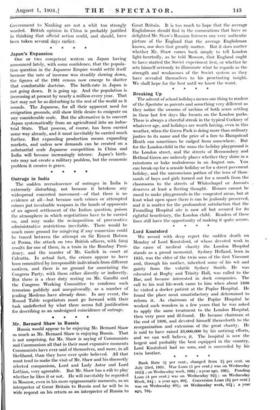Outrage in India The sudden recrudescence of outrages in India
is extremely disturbing, not because it betokens any widespread concerted movement—of that there is no evidence at all—but because such crimes or attempted crimes put invaluable weapons in the hands of opponents of an agreed settlement of the Indian question, poison the atmosphere in which negotiations have to be carried on, and may make the re-imposition of provocative administrative restrictions inevitable. There would be much more ground for misgiving if any connexion could be traced between the attempt on Sir Ernest Hotson at Poona, the attack on two British officers, with fatal results for one of them, in a train in the Bombay Presi- dency, and the murder of Mr. Garlick in court at Calcutta. In actual fact, the crimes appear to have been committed by irresponsible individuals from different motives, and there is no ground for associating the Congress Party, with them either directly or indirectly. But there is a clear duty resting on Mr. Gandhi and the Congress Working Committee to condemn such terrorism publicly and unequivocally, as a number of reading Moslems have already done. In any event, the Round Table negotiators must go forward with their task undeflected by what there seems full justification for describing as an undesigned coincidence of outrage.
* * * *


































 Previous page
Previous page